Searching for the perfect canine companion but dreading the endless battle against shedding dog hair? You’re in luck! Many small dog breeds offer the joy of pet ownership without the constant cleanup. For those with allergies, a sensitive nose, or simply a preference for a tidy home, finding small dogs that don’t shed is a top priority. This comprehensive guide, complete with appealing pictures, highlights a variety of fantastic small dog breeds known for their minimal to non-shedding coats, helping you identify your next furry family member.
Understanding Non-Shedding and Low-Shedding Dog Breeds
Before diving into our list of delightful breeds, it’s helpful to understand what “non-shedding” truly means. While no dog is 100% shed-free, breeds typically labeled as non-shedding or hypoallergenic generally produce less dander and hair, making them excellent choices for allergy sufferers or those who prefer a cleaner living environment. Their coats often consist of hair similar to humans, which grows continuously and needs regular grooming rather than shedding seasonally. This guide will introduce you to several charming small dog breeds that don’t shed a lot, making pet care a more pleasant experience.
Affenpinscher
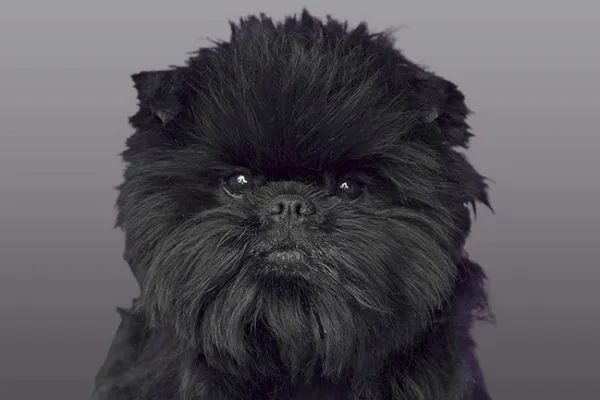 Affenpinscher dog with wiry black fur, a small dog that doesn't shed much, looking alertly at the camera
Affenpinscher dog with wiry black fur, a small dog that doesn't shed much, looking alertly at the camera
True to its German name, “monkey-like terrier,” the Affenpinscher boasts an intelligent and mischievous personality packed into a small frame. This fearless Toy breed is an excellent watchdog, alerting you to visitors without leaving a trail of fur behind. The Affenpinscher’s wiry coat sheds very little and has almost no “doggy odor,” making it a low-maintenance choice for cleanliness. A simple twice-weekly brushing with a slicker brush and comb is usually sufficient to keep their shaggy-yet-neat appearance. These charming dogs are also celebrated for their sense of humor, bringing endless entertainment to their owners.
Basenji
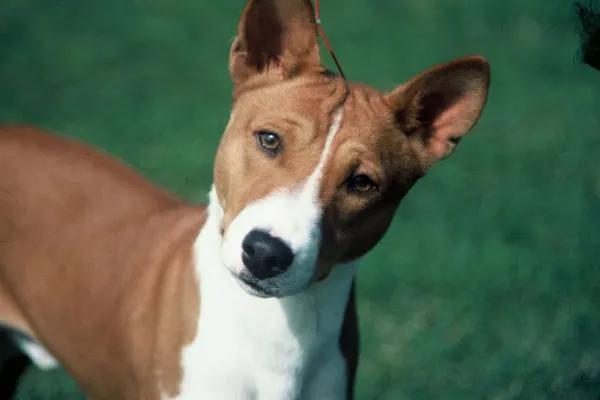 A sleek, short-haired Basenji, a small dog breed that sheds minimally, sitting gracefully outdoors
A sleek, short-haired Basenji, a small dog breed that sheds minimally, sitting gracefully outdoors
If you appreciate the elegance of hounds but prefer to avoid their characteristic odor and heavy shedding, the Basenji could be your ideal small dog. This unique breed sheds very minimally, thanks to its short, fine coat that requires little more than occasional brushing. Basenjis are also famously known as “barkless dogs” due to their unusual vocalizations, making them a quiet companion perfect for apartment living, provided they receive adequate daily exercise and mental stimulation. Their independent nature and curious spirit make them fascinating companions.
Bichon Frise
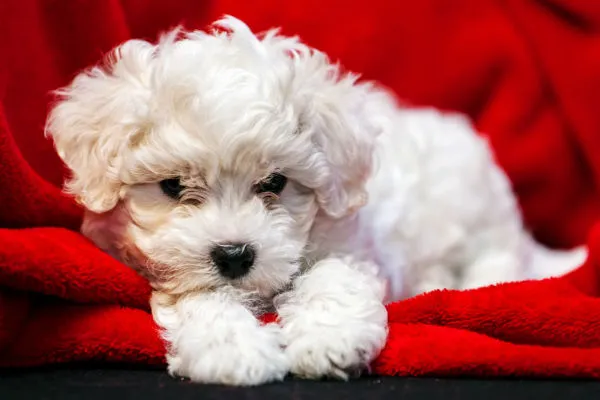 A fluffy white Bichon Frise, a non-shedding small dog, sitting playfully with its distinctive powder-puff coat
A fluffy white Bichon Frise, a non-shedding small dog, sitting playfully with its distinctive powder-puff coat
The Bichon Frise is renowned as a truly non-shedding small dog breed, often recommended for individuals with allergies. These playful, affectionate dogs are like living powder-puffs, constantly growing hair that demands consistent grooming. To maintain their iconic fluffy appearance and prevent mats, frequent brushing, regular professional grooming, and occasional baths are essential. Beyond their low-shedding appeal, Bichons are known for their cheerful disposition and make wonderful companions for families.
Bolognese
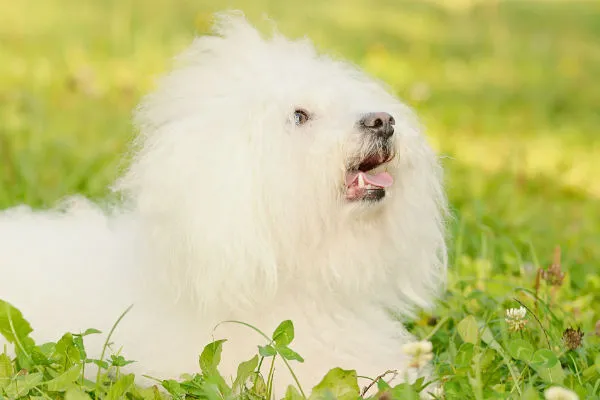 A pure white Bolognese dog with a curly, fluffy coat, a small non-shedding breed, sitting calmly
A pure white Bolognese dog with a curly, fluffy coat, a small non-shedding breed, sitting calmly
Similar to the Bichon Frise, the Bolognese possesses a distinctive fluffy coat comprised of hair rather than fur, which means they do not shed in the traditional sense. While their coat won’t end up all over your furniture, dead hair must be brushed out regularly to prevent tangles and mats. Daily grooming is crucial to keep these lovable lap dogs looking their best. Known for their calm and devoted nature, Bolognese dogs thrive on companionship and are content being by their owner’s side.
Brussels Griffon
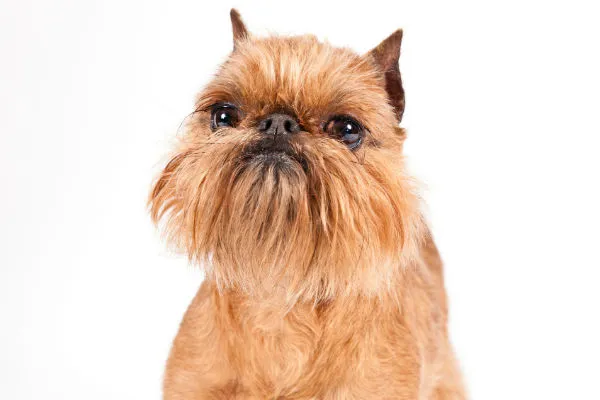 A rough-coated Brussels Griffon, a charming small dog that sheds minimally, with an expressive face
A rough-coated Brussels Griffon, a charming small dog that sheds minimally, with an expressive face
Despite their diminutive size, Brussels Griffons are sturdy dogs that don’t demand excessive pampering. Available in both smooth-coated and rough-coated varieties, both shed minimally with regular grooming. Their compact size means their exercise needs are easily met with daily walks and indoor play, making them ideal for various living situations. These loyal little dogs flourish in homes where their families are frequently present, offering endless affection and a touch of comical charm. For those seeking small family dogs that don’t shed, the Brussels Griffon is a delightful choice.
Chinese Crested
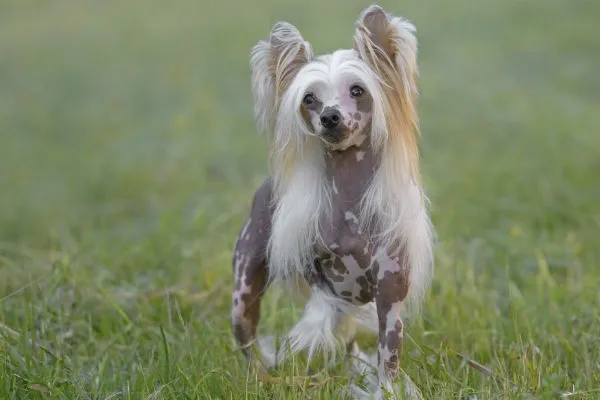 A hairless Chinese Crested dog showing its unique skin and tufts of hair, a small non-shedding breed
A hairless Chinese Crested dog showing its unique skin and tufts of hair, a small non-shedding breed
For the ultimate solution to shedding, consider a hairless small dog breed like the Chinese Crested. This breed comes in two types: hairless, with tufts of hair on their head, tail, and feet, and “powderpuff,” which has a soft, fine coat that sheds very minimally. Hairless varieties require special skin care, including protection from sun and cold, and are prone to skin irritations. Both types are affectionate, charming, and thrive on human companionship. Their unique appearance and loving personalities make them truly distinctive pets.
Coton de Tulear
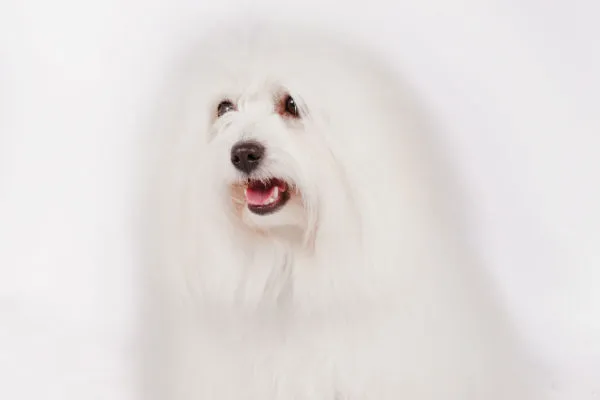 A Coton de Tulear with its long, soft, white coat, a hypoallergenic small dog that doesn't shed, looking friendly
A Coton de Tulear with its long, soft, white coat, a hypoallergenic small dog that doesn't shed, looking friendly
The Coton de Tulear is celebrated for its distinctive long, fluffy coat, which is often considered hypoallergenic. This makes them an excellent option for allergy sufferers and anyone seeking a small dog that doesn’t shed. While Coton de Tulear dogs require daily grooming to keep their magnificent coats free of mats and debris, their lighthearted, gentle, and eager-to-please natures make the grooming effort a worthwhile part of bonding. They are known as “Royal Dogs of Madagascar” for their charming personalities.
Havanese
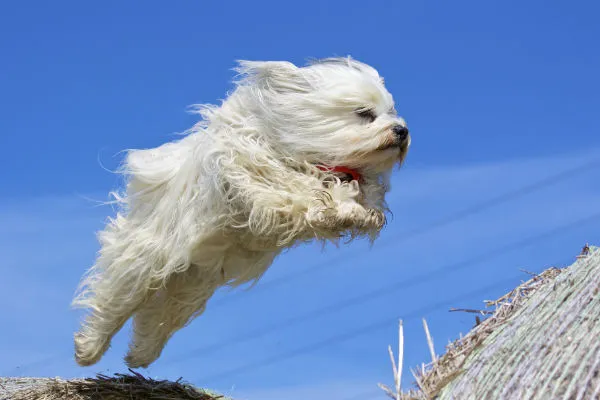 A Havanese dog with a long, silky coat, a playful small breed that doesn't shed, looking bright-eyed
A Havanese dog with a long, silky coat, a playful small breed that doesn't shed, looking bright-eyed
These charming native Cuban dogs offer their owners both patented spunky charm and a non-shedding coat, which translates to less time spent lint-rolling furniture and more time enjoying the playful Havanese. Their silky double coat requires weekly brushing and regular baths to keep it clean, healthy, and tangle-free. Havanese are known for their affectionate nature and intelligence, making them excellent companions for a variety of households. Their adaptability and eagerness to please mean they often make easy to train small dogs that don’t shed.
Maltese
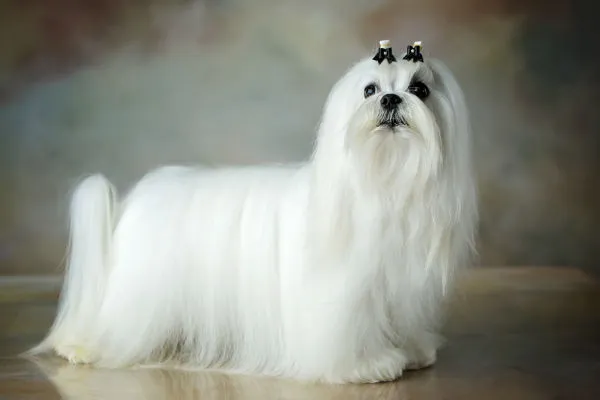 A elegant Maltese dog with flowing white hair, a non-shedding small dog breed, sitting regally
A elegant Maltese dog with flowing white hair, a non-shedding small dog breed, sitting regally
Maltese dogs have captivated humans for over three millennia. This ancient dog breed from Malta has maintained its appeal, partly due to its long, flowing white coat that sheds very little, making it an ideal lap dog. While low-shedding, their beautiful coats do require regular brushing to prevent mats and an occasional bath to keep them sparkling clean and free of dirt. Known for their gentle and loving temperament, Maltese dogs thrive on attention and make devoted companions.
Lhasa Apso
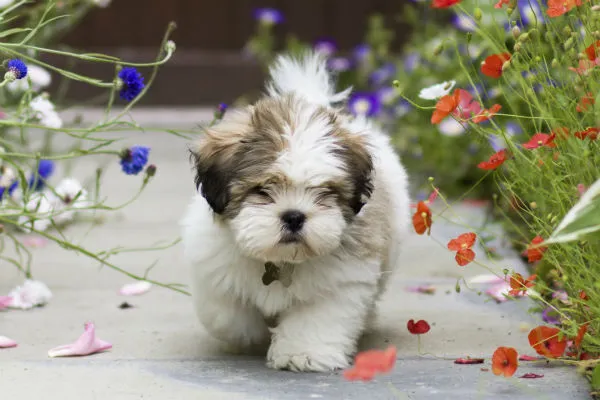 A Lhasa Apso with a long, luxurious coat covering its face, a small non-shedding companion dog
A Lhasa Apso with a long, luxurious coat covering its face, a small non-shedding companion dog
Originating from Tibet, the Lhasa Apso is a small dog breed that makes an excellent companion. These dogs are calm yet playful, enjoying brisk walks as much as they do resting comfortably in their owner’s lap. Lhasa Apsos do not shed, but their long, dense double coats demand consistent maintenance to prevent tangles and skin issues. Many owners opt for a shorter “puppy cut” to simplify daily grooming and brushing, ensuring their furry friend remains comfortable and stylish.
Miniature Schnauzer
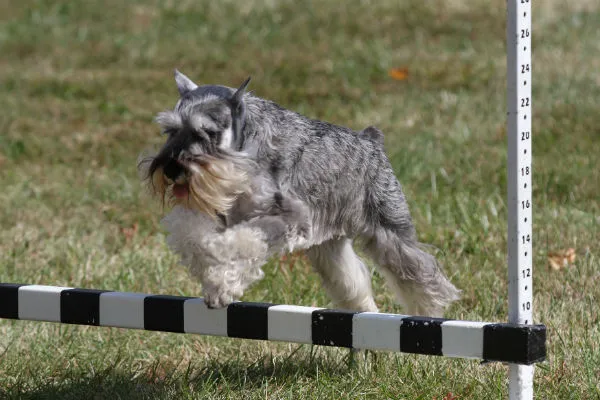 A distinctive Miniature Schnauzer with wiry salt-and-pepper fur, a smart small dog that sheds very little
A distinctive Miniature Schnauzer with wiry salt-and-pepper fur, a smart small dog that sheds very little
The Miniature Schnauzer is a smart, trainable, and cheerful little dog that shares a strong resemblance to its larger Standard Schnauzer cousin. This popular Terrier sheds very little, making it a great choice for those seeking a low-shedding companion. Their adaptable nature allows them to be equally at home in urban apartments or country settings, provided they are close to their human companions. Weekly brushing and regular professional grooming are recommended to keep Miniature Schnauzers looking their best and to maintain their distinctive wiry coat.
Poodle
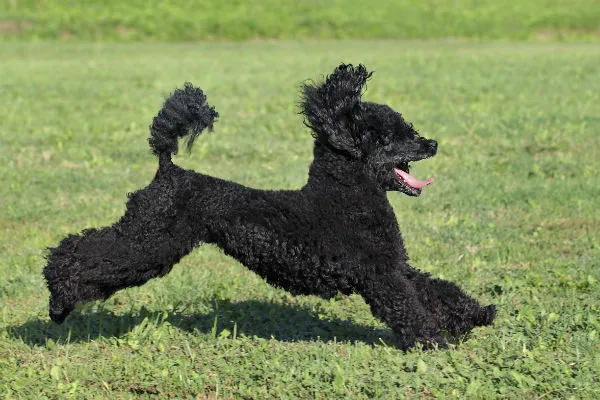 A Miniature Poodle with its curly, non-shedding coat, an intelligent small dog breed, standing attentively
A Miniature Poodle with its curly, non-shedding coat, an intelligent small dog breed, standing attentively
When people think of small dogs that don’t shed, Poodles often come to mind, and for good reason. Poodles are renowned for being non-shedding and hypoallergenic, making them one of the most popular choices for allergy sufferers. Miniature and Toy Poodles offer these desirable qualities in intelligent, petite packages, differing only in size from their Standard counterparts. All Poodles are exceptionally intelligent and highly trainable, exhibiting an active and proud demeanor. Their curly hair requires regular professional grooming to prevent matting and maintain coat health. These are truly intelligent small dogs that don’t shed.
Scottish Terrier
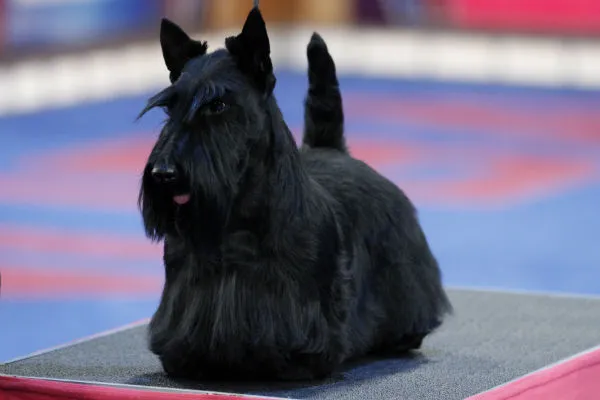 A black Scottish Terrier with its characteristic wiry coat, a bold small dog that sheds minimally
A black Scottish Terrier with its characteristic wiry coat, a bold small dog that sheds minimally
The Scottish Terrier, affectionately known as a Scottie, is a Terrier breed celebrated for its boldness, confidence, and big personality in a small body. Their wiry, weather-resistant coat sheds very little, making them a good option for those seeking a low-shedding dog. However, they do require regular brushing, grooming, and occasional hand-stripping to keep their coat healthy and preserve the breed’s distinctive outline. Scotties are clever and independent dogs with strong prey drives, which owners should be mindful of around smaller pets.
Shih Tzu
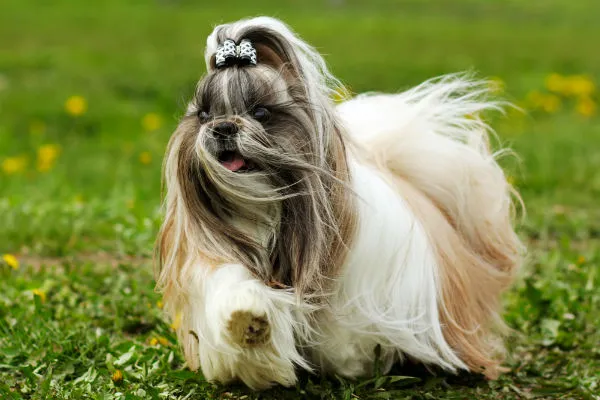 A Shih Tzu with long, luxurious hair tied up, a low-shedding small dog breed, looking adorable
A Shih Tzu with long, luxurious hair tied up, a low-shedding small dog breed, looking adorable
The Shih Tzu is another breed with a long and regal pedigree, once the favored house pet of the Tang Dynasty. These “little lion dogs” come in a variety of colors and patterns. Their long, silky hair is very low-shedding and looks exceptionally majestic when brushed out, befitting their royal ancestry. This Toy breed is sturdy and lively, often described as having an arrogant carriage due to their proudly held heads and curling tails. Bred purely as house pets, their gentle, trusting nature makes them exceptional and devoted companions.
West Highland White Terrier
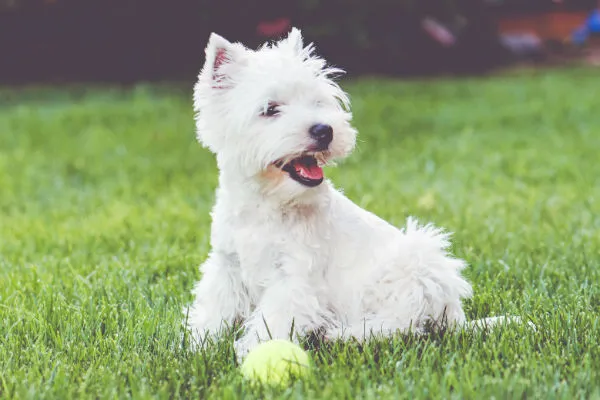 A classic white West Highland White Terrier (Westie), a sturdy small dog that sheds minimally, sitting outdoors
A classic white West Highland White Terrier (Westie), a sturdy small dog that sheds minimally, sitting outdoors
The coarse, pure white hair of the West Highland White Terrier, fondly known as Westies by their admirers, sheds very little. This sturdy little dog is intelligent, loyal, happy, and highly entertaining. Westies are curious dogs with moderate energy levels and possess an independent streak common among all Terriers, which can sometimes make training an interesting challenge. Their cheerful disposition and minimal shedding make them a fantastic choice for many households seeking a lively, compact companion.
Xoloitzcuintli
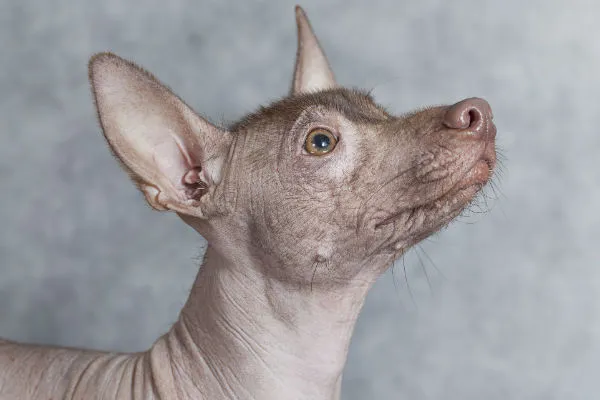 A hairless Xoloitzcuintli (Mexican Hairless dog) showing its unique appearance, a rare small dog that doesn't shed
A hairless Xoloitzcuintli (Mexican Hairless dog) showing its unique appearance, a rare small dog that doesn't shed
Also known as the Mexican Hairless, the Xoloitzcuintli is an ancient and relatively rare breed that can be found in both hairless and coated varieties. The hairless type retains a small amount of hair on their heads, while the coated variety has a very short, fine coat that sheds minimally. As with any hairless breed, Xolos require extra attention to their skin for protection against the elements. Xolos are attentive watchdogs and affectionate companions, known for their tranquil personality around the home, despite enjoying physical activities like walks and vigorous play. They are truly dogs that don’t shed and stay small.
Yorkshire Terrier
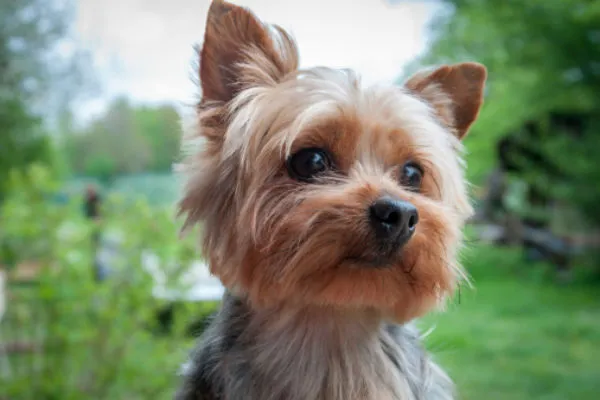 A perky Yorkshire Terrier (Yorkie) with its silky, non-shedding coat, a popular small dog breed
A perky Yorkshire Terrier (Yorkie) with its silky, non-shedding coat, a popular small dog breed
Sprightly, full of personality, and affectionately known as the Yorkie, the Yorkshire Terrier is a Toy breed that charms with its tomboyish yet regal demeanor. These spunky lap dogs are incredibly popular, and for good reason. Yorkshire Terriers do not shed, and their long, silky coats are beautiful when brushed out daily, a task made easy by their small size. Despite their often pampered appearance, Yorkies have working-class roots, originally hunting rats in English clothing mills. Today, they are just as content being doted upon as they are exploring their surroundings.
Beyond Shedding: Choosing Your Ideal Companion
While finding small dogs that don’t shed is a primary concern for many, it’s crucial to remember that a non-shedding coat doesn’t equate to zero maintenance. Many of these breeds have continuously growing hair that requires regular brushing, professional grooming, and occasional bathing to prevent matting and keep them healthy. Neglecting grooming can lead to discomfort, skin problems, and expensive vet visits.
When selecting a non-shedding small dog, consider their other needs:
- Temperament: Do you want a playful, energetic dog or a calm lap companion?
- Exercise Needs: Can you meet their daily requirements for walks and playtime?
- Grooming Commitment: Are you prepared for daily brushing or regular trips to the groomer?
- Training: Some small breeds can be more challenging to train due to their independent natures.
Thoroughly researching the unique characteristics of each non-shedding breed will help you find the perfect match for your lifestyle and personality. Always prioritize purchasing a dog from a reputable breeder or adopting from a trusted rescue organization. Ensure your new furry friend receives a high-quality diet and regular veterinary check-ups to maintain their health and happiness for years to come. By making an informed decision, you’ll welcome a loving companion that brings joy without the mess.
